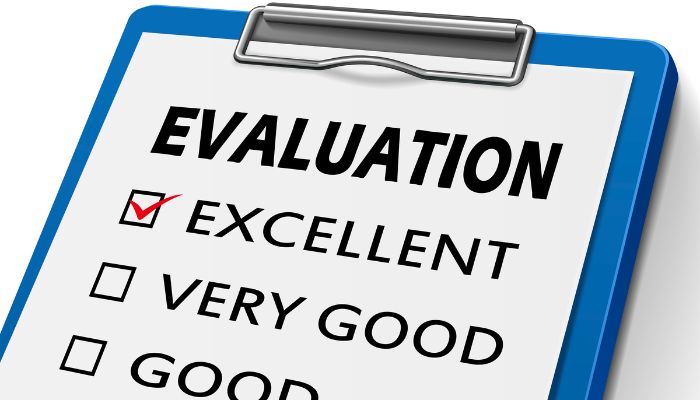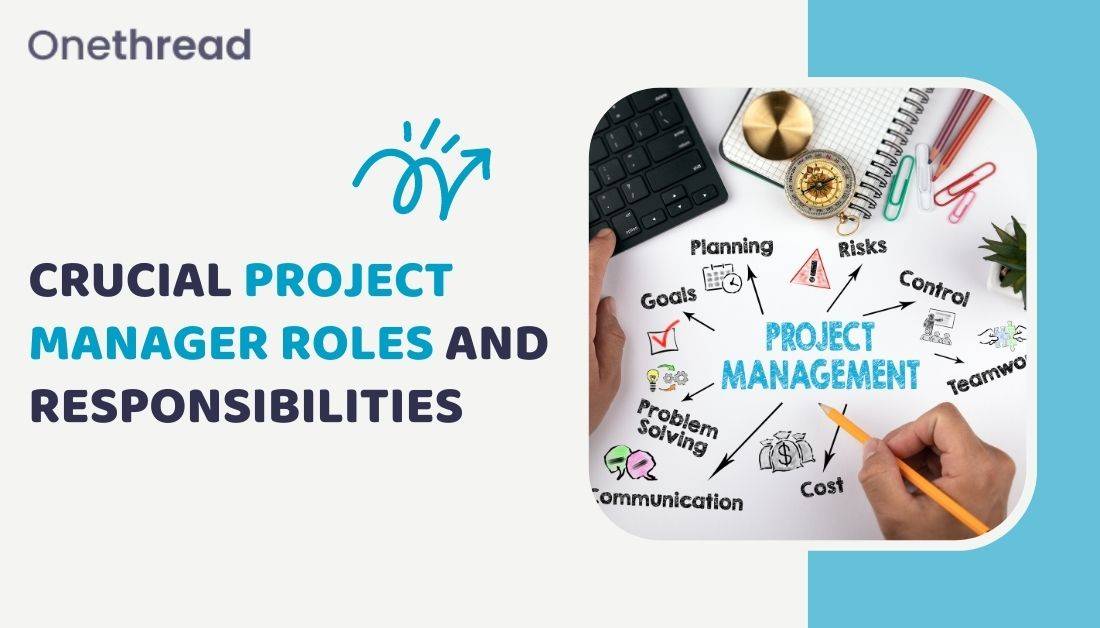In today’s fast-paced environment, projects are the lifeblood of organizations. They are the vehicles that drive innovation, change, and growth. Who’s behind the wheel?
Even according to a report by PMI, approximately 47% of firms have created distinct career pathways for project managers.
But what exactly does a project manager do? Well, they wear many hats. They’re the strategic thinker, the master planner, the effective communicator, the problem solver, and the team motivator.
So whether you’re a seasoned pro or just starting, you should be familiar with project manager roles and responsibilities. And we’ll help you with that so that you can become a prominent project manager.
Project Manager: What Exactly is the Role?
You should know that as a project manager, you must plan, organize, and see a project through from start to finish.

Whether developing new software, launching a product, or revamping a marketing strategy, you’re the go-to person. As a PM, you hold the key to overseeing crucial projects.
Your leadership, uplifting skills, and coordination are essential for driving the team toward success. As a project manager, you must be there every step of the way, handling challenges and driving project success.
Therefore, stay adaptable, motivate your team, and be the driving force.
What is the Importance Of A Project Manager?
Project managers play a crucial role in any project or company. They’re the ones who plan, organize, and lead projects, ensuring that goals are met while staying within budget.
Underneath are a few reasons why project managers are indispensable —
- To keep an eye on the progression and output of their team
- Making preparations to reduce risks related to the project after analyzing possible risks
- Organize, inspire, and guide the whole project crew.
- Manage the financial expenses and both internal and external resources.
- Improve collaboration amongst everyone on the team.
Exploring a Project Manager’s Roles and Responsibilities
In this fast-paced business world, as a project manager, you must stay on top of the latest project management systems, industry jargon, and trends. It’s a combination of science and art, which you must master.
It’s an ever-expanding field, bringing different industries together to manage people and resources effectively.
Hence, without taking much of your valuable time, let’s start talking about the fundamental and pivotal duties and tasks of project managers:
1.Taking Charge of the Entire Process
A project manager’s mission is to gain more with less. That means you’ll need to achieve more results without compromising quality. Plus, satisfy your customers while spending less time and resources.

Your job is to be a dream-weaver for your clients or stakeholders, finding the fastest and simplest route to realize their aspirations. And for that, you can choose different approaches like waterfall, Agile, or Prince2 to make it happen.
That brings you to create a killer strategy or plan for your team and project success. So, your roles in this exciting project management involve —
- Split the project into various tasks
- Further, break down tasks into manageable subtasks
- Set up schedules for essential activities
- Establish milestones to track progress and celebrate achievements
- Ensure everyone is aware of the project’s reliance
- Keep things organized and move forward smoothly
2.Leading the Team Toward a Shared Objective
As a project manager, one of your most important roles is to keep your team in sync with the organization’s goals. We understand that it’s easier said than done.

With some elbow grease, you can craft a plan that supports the team and makes reaching goals a breeze. You just need to motivate everyone and bring out their best.
Here are some things you might need to do:
- Mediate job responsibilities of existing employees
- Handle their schedules to meet project commitments
- Pull off bids and contracts
- Keep everyone on track and moving forward according to the plan
3.Effectively Assigning Tasks and Responsibilities
You better delegate responsibilities wisely when dealing with a large project or many tasks. As a project manager, it’s time to shine and show off your leadership skills.

But it’s been found that a majority of project managers, about 59%, handle a workload of 2 to 5 projects simultaneously. In such cases, to execute project manager roles and responsibilities effortlessly, OneThread can help you.
Onethread is an incredible cloud-based tool that’ll supercharge your team collaboration and project management. With this tool, you can wave away complicated schedules and say hello to simplified project delivery.
In addition, it has got many advantageous features for you —
- Effortless to use, with no need for extra software.
- Offers video conference, team chat, and instant messaging.
- Seamlessly integrate with all your favorite toolkits.
- Create projects and assignments, and share files seamlessly.
- Allows you to track leads and collaborate on sales.
- Collaborate with different team members on multiple projects.
4.Effectively Managing Time as a Valuable Resource
As a project manager, you must leave an exceptional imprint on the client and stakeholders. After all, your project’s success or failure hinges on it.

It’s all about being on top of things and keeping everyone in the loop. So, how can you do that? Well, you’ll need to —
- Set doable deadlines that you and your team can meet.
- Share those deadlines with your hard-working team and get everyone on the same page.
Along with that, you must know what makes a project shine. Check out these key features:
- Know what the project aims to achieve.
- Lay out the step-by-step plan to get things done.
- Figure out how long each task will take.
- Create a well-structured timeline.
- Keep an eye on the schedule and make adjustments if needed.
5.Effectively Overseeing the Deployment of Deliverables
Alright, now, let’s get honest about a project manager’s responsibilities. It’s not just about delivering the goods but also making sure it’s done timely and on budget. As the project manager, you’ll be asking yourself all sorts of questions.

Check them out:
- What’s going on in your organization? Any changes?
- What’s the team up to? What are they working on?
- What is the purpose of this project?
- Are there any business opportunities or risks we need to know?
- How we’ll pull it off? What’s our plan?
- Any effective project management strategies we can use?
- Who’s doing what? Let’s get those roles sorted.
- Where can we find all the project documents and records?
- What are the specs, schedule, and important meetings?
- When are we going to wrap things up and call it a day?
6.Keeping an Eye On the Progress and Identifying Any Obstacles
Another vital responsibility of a project manager’s to monitor project progress. It’s all about staying in the loop and ensuring everything’s on track.

Here’s how to do it effectively:
- Once the project starts, you must keep tabs on how things are going and if they’re going as planned.
- The midway phases of the project are essential. That’s when you’ll use tools like meetings, status reports, and casual updates to stay in the know.
- Get Onethread, the proper management software to keep you on track with tasks and deadlines.
7.Hosting Frequent Meetings
The art of scheduling meetings as a project manager can be a tricky task, but it’s not impossible.

To hold successful meetings, you’ll need to follow the following—
- While regular meetings may not work for each project, following patterns like the framework of Scrum suggests having a fast 15-minute speak-up daily. This helps establish a clear status update among the team.
- Remember to underestimate the power of well-structured meetings. They work wonders for your project’s success.
- The key is to have a clear objective for each meeting and effectively communicate the project rules to the whole team.
- Being proactive and prepared from the get-go is crucial as a project manager. Establish and adhere to a meeting schedule unless a genuine emergency requires cancellation.
8.Creating a Common Vision Among Team Members
A shared vision unites the team, enhances their sense of purpose, and drives them toward success. So, ensure your vision is clear and effectively communicated to inspire and empower your team members.

It’s beneficial for the following reasons:
- You must have an overview of where you want the project to go. It includes understanding the bigger picture and long-term goals.
- However, it’s equally important to communicate this vision to the entire team effectively. When everyone understands the purpose and significance of their roles, they become more motivated and engaged in achieving the desired results.
- Ensure the team knows the workflow and the efforts required to turn goals into actionable missions. This helps align their efforts and ensures everyone works towards the same objectives.
- It’s your obligation as the project manager to create the right rhythm for the project. So, encourage teamwork, open communication, and shared goals. It’ll prepare the path for easier progress and achievement in the future.
9.Handling Documentation and Reports Efficiently
Once the project is completed within the schedule and budget constraints, it is your turn to handle all necessary paperwork. As a part of your job, you’ll also present the outcomes to clients.

Now, this documentation serves two crucial purposes:
- Keeping a record: A comprehensive record of all project activities and the individuals involved in its execution.
- Ensuring project compliance: Ensuring the project meets all the specified requirements and objectives.
10.Thinking of an Alternative Strategy
As a project manager, you need to plan for the expected and be prepared for the unexpected because it’s all about being proactive and adaptable to keep the project running smoothly, even when things don’t go as planned.

That’s where having an alternative strategy comes into play. Look at some key points to consider in handling unforeseen events —
- Be ready to arrange additional resources when needed to tackle any challenges.
- Manage your time effectively in stressful situations to keep the project on schedule.
- Have an alternate plan to address deviations or setbacks and meet client expectations.
11.Empowering Your Team to Govern Itself
Today’s Agile teams focus on working more intelligently and more efficiently, striving for excellence through sleek practices. Thus, as a project manager, you must embrace new management techniques.

You should also enable your team to perform cross-functionally and autonomously. That way, you’ll be preparing your team to:
- Tackle blocks and easily adjust to changes in the expectations of clients.
- Coordinate effectively with buyers and handle multiple responsibilities simultaneously.
- Embrace flexibility in roles and thrive in diverse niches.
When you implement these practices, you’ll see a remarkable transformation in your team’s agility and adaptability. They’ll be ready to take on any challenge that comes their way, guaranteeing project success.
Remember, it’s all about nurturing a culture of constant improvement and teamwork within your team.
12.Fostering a Strong Bond Within the Team
As a project manager, you should create a close-knit team that works together harmoniously toward project success.

Here are some critical points for a project manager to consider:
- Give constructive feedback to team members to help them improve and grow.
- Ensure that everyone understands their specific roles and responsibilities within the project.
- Encourage open and transparent communication among team members to facilitate collaboration and problem-solving.
- Create an environment where team members feel comfortable working together and supporting one another.
- Establish trust within the team by being reliable, transparent, and supportive.
- Facilitate knowledge sharing and best practices among team members to enhance their skills and capabilities.
- Ensure the team can access the resources, tools, and technologies to perform their tasks effectively.
- Address conflicts or issues within the team promptly and help constructively resolve them.
- Encourage a positive, inclusive team culture that values diversity, creativity, and innovation.
- Recognize and celebrate the team’s achievements to boost morale and motivation.
13.Collaborating Effectively with Clients
To ensure project success, you must coordinate effectively with your clients. It’ll help establish clear communication, ensuring everyone is on the same page and working towards the same goals.

And that includes —
- Engaging in discussions with clients and stakeholders to understand project requirements and expectations.
- Negotiating and clarifying project details and deliverables with your clients.
- Documenting client requirements and ensuring they are communicated effectively to the team.
- Seeking client feedback and reviewing their input on the work done.
- Identifying areas that require changes or improvements based on client reviews.
- Collaborating with clients to address any concerns or issues during the project.
14.Ensuring the Quality and Compliance of the Project
As a project manager, you must ensure high standards and compliance with guidelines. By effectively managing quality, you can ensure that the project delivers excellent results and meets the required standards.

Consequently, you must work closely with your team, stay informed, and take proactive measures. Thus, you’ll be able to maintain quality throughout the project.
That being said, you need to create a comprehensive plan for quality management. This plan acts as a guide, outlining the project’s quality requirements and setting up control procedures to keep everything in check.
To ensure quality throughout the project, you can do the followings —
- Work closely with your team members to identify potential quality concerns and take corrective actions when needed.
- Stay updated on relevant laws and regulations to ensure the project complies with them.
- Collaborate with compliance experts to ensure regulatory conformity.
In addition, you should be able to handle quality-related risks that could impact the project’s success. And you can do that by —
- Keep a close eye on the project’s progress and look for any quality issues.
- Taking prompt and appropriate actions to address those issues and minimize risks.
15.Properly Evaluating and Closing the Project
When managing a project, it’s essential to ensure it’s been completed and evaluated.

Here’s how it helps you, your team, and your company —
- Closing out a project involves meeting all goals, completing deliverables, and satisfying stakeholders.
- Having a formal project closing plan is vital for a smooth project closure.
- The plan should outline the steps for wrapping the project, including finishing deliverables and achieving project objectives.
- A final project review should be conducted to assess the project’s performance, learn lessons, and provide suggestions for future projects.
- After officially closing the project, it’s essential to evaluate its success.
- The analysis should consider the project’s progress regarding goals, schedules, and finances.
- Gathering stakeholder feedback is vital to identify areas for improvement and potential future projects.
Properly closing and evaluating a project helps demonstrate its value to stakeholders. Besides, it also identifies opportunities for improvement in future ventures.
What Criteria or Credentials Do You Need to Be a Project Manager?
Being a project manager means taking control of organizing and carrying out projects in a company or business. It’s a role that requires you to be a good leader, have effective communication capabilities, and be meticulous.
The responsibilities remain the same whether it’s a tiny or large project.
Now, different companies may have their specific requirements. But generally, you’ll need at least three years of relevant experience and official training or certification such as PMP.
- To qualify for this job, you should be well-organized
- Pay close attention to details.
- Have good communication and people skills (essential)
- Ability to work on your own without constant overseeing
- Have the ability to solve problems.
- Familiar with Excel, PowerPoint, Word, etc., tools are also helpful for everyday tasks.
Knowing project management approaches and concepts and having experience leading teams or projects are essential.
Final Words
Project managers are vital in any organization, juggling multiple responsibilities to ensure successful project outcomes.
They’re the linchpins that hold teams together, translating vision into action. Plus, they’re effective communicators, adept problem solvers, and skilled motivators.
By overseeing every project’s lifecycle, they ensure smooth execution, timely delivery, and customer satisfaction. From defining project objectives to managing budgets and resources, project manager roles and responsibilities are massive.
FAQs
- What is the role of a project manager?
A project manager’s role is to manage and lead a project. They plan, organize, and oversee everything to ensure the project is completed successfully, on time, and within budget.
- What are some common challenges faced by project managers?
Project managers often encounter challenges that can impact project success, such as —
- Resource constraints
- Changing requirements
- Communication issues
- Stakeholder management
- Balancing competing priorities
- How does a project manager ensure quality control in a project?
To ensure quality control in a project, a project manager implements quality standards, conducts regular inspections, and performs in-depth testing. These steps help identify any issues and make necessary improvements. Additionally, establishing feedback mechanisms allows for addressing concerns and enhancing overall quality.
